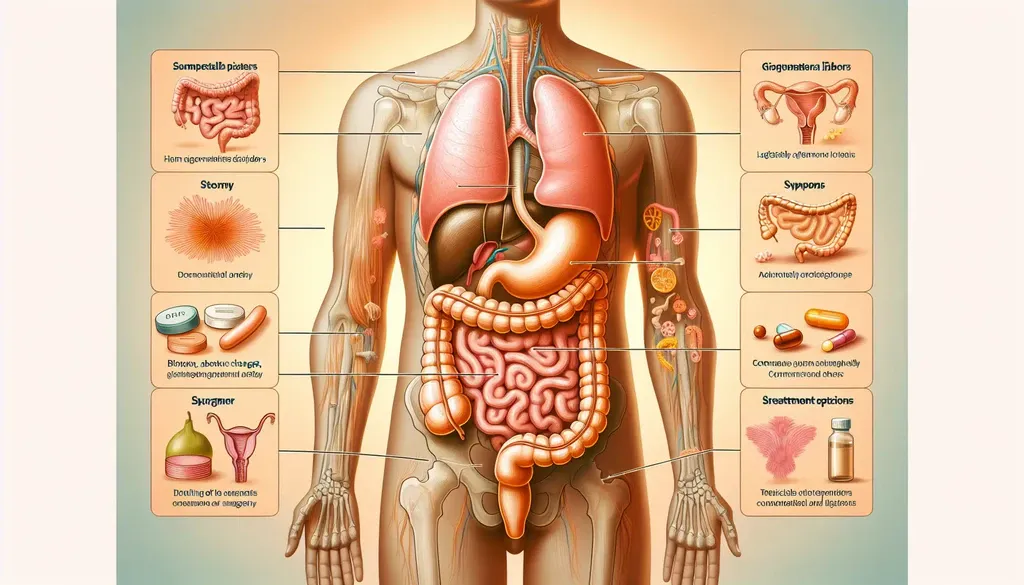Understanding Gastrointestinal Disorders: Key Symptoms and Effective Treatments
Gastrointestinal (GI) disorders are a broad category of conditions that affect the digestive tract, which includes the esophagus, stomach, intestines, liver, pancreas, and gallbladder. These disorders can range from mild and temporary discomfort to chronic and debilitating diseases. Understanding the symptoms and treatments of gastrointestinal disorders is essential for early diagnosis, effective management, and improving the quality of life for those affected.
Overview of the Gastrointestinal System
The gastrointestinal system plays a crucial role in breaking down food, absorbing nutrients, and eliminating waste. It starts from the mouth and extends through the esophagus, stomach, small intestine, large intestine (colon), rectum, and anus. Accessory organs like the liver, pancreas, and gallbladder aid digestion by producing enzymes and bile.
When any part of this complex system malfunctions, it can lead to various GI disorders. These disorders can be caused by infections, inflammation, autoimmune reactions, structural abnormalities, or functional problems.
Common Gastrointestinal Disorders
- Gastroesophageal Reflux Disease (GERD)
GERD occurs when stomach acid frequently flows back into the esophagus, irritating its lining. This reflux causes heartburn, a burning sensation in the chest, and regurgitation of food or sour liquid. - Irritable Bowel Syndrome (IBS)
IBS is a functional disorder characterized by abdominal pain, bloating, and changes in bowel habits such as diarrhea, constipation, or both. The exact cause is unknown, but it is linked to gut-brain interaction issues. - Inflammatory Bowel Disease (IBD)
IBD includes Crohn’s disease and ulcerative colitis, which involve chronic inflammation of the GI tract. Symptoms include severe diarrhea, abdominal pain, fatigue, and weight loss. - Peptic Ulcers
These are sores that develop on the lining of the stomach, small intestine, or esophagus due to the erosion caused by stomach acid. Common symptoms include burning stomach pain, nausea, and vomiting. - Celiac Disease
An autoimmune disorder where ingestion of gluten leads to damage in the small intestine. Symptoms include diarrhea, bloating, and malnutrition. - Gallstones and Gallbladder Disease
Gallstones are hardened deposits of digestive fluid that can block the bile ducts, causing pain and digestive problems.
Symptoms of Gastrointestinal Disorders
GI disorders can manifest with a wide range of symptoms. Some common symptoms to be aware of include:
- Abdominal Pain and Cramping: Often a primary symptom, it can vary in intensity and location.
- Bloating and Gas: Excess gas production or difficulty in passing gas can cause discomfort.
- Heartburn: A burning sensation behind the breastbone, often linked to acid reflux.
- Nausea and Vomiting: Can indicate infection or obstruction in the GI tract.
- Diarrhea: Frequent loose or watery stools often signal infection, inflammation, or malabsorption.
- Constipation: Difficulty or infrequent bowel movements, often due to diet or motility issues.
- Unintended Weight Loss: May suggest a more serious underlying condition.
- Blood in Stool: Can be a sign of bleeding in the GI tract, requiring immediate evaluation.
Diagnosis of GI Disorders
Proper diagnosis usually involves a combination of medical history review, physical examination, and diagnostic tests such as:
- Endoscopy: A camera inserted through the mouth or rectum to view the digestive tract.
- Colonoscopy: Examination of the colon and rectum using a flexible tube.
- Imaging Tests: Ultrasound, CT scans, and MRI can help visualize organs.
- Stool Tests: To detect infections, blood, or inflammatory markers.
- Blood Tests: To check for anemia, infection, or autoimmune markers.
- Breath Tests: Used for diagnosing infections like Helicobacter pylori or lactose intolerance.
Treatment Options for Gastrointestinal Disorders
Treatment depends on the specific disorder, its severity, and the patient’s overall health. Common treatment approaches include:
Lifestyle and Dietary Modifications
- Dietary Changes: Avoiding trigger foods such as spicy, fatty, or acidic foods can reduce symptoms. For celiac disease, strict gluten avoidance is necessary.
- Hydration: Adequate fluid intake helps manage constipation and diarrhea.
- Exercise: Regular physical activity supports healthy digestion.
- Stress Management: Techniques like meditation and yoga can alleviate symptoms of stress-related GI disorders like IBS.
Medications
- Antacids and Acid Reducers: Used for GERD and peptic ulcers to reduce stomach acid.
- Antispasmodics: To relieve cramping and bowel spasms.
- Anti-inflammatory Drugs: Such as corticosteroids for IBD.
- Antibiotics: For bacterial infections like H. pylori.
- Laxatives or Stool Softeners: To relieve constipation.
- Immunosuppressants and Biologics: For severe autoimmune GI diseases like Crohn’s disease.
Surgical Interventions
In some cases, surgery may be necessary, such as:
- Removing damaged sections of the intestine in IBD.
- Gallbladder removal for gallstones.
- Repairing hernias or correcting structural abnormalities.
Living with Gastrointestinal Disorders
Managing a GI disorder often requires long-term care and lifestyle adjustments. Patients benefit from:
- Regular follow-ups with healthcare providers.
- Nutritional counseling and support.
- Psychological support for coping with chronic illness.
- Education about recognizing symptom flare-ups and when to seek medical attention.
When to See a Doctor
Prompt medical consultation is recommended if you experience:
- Severe or persistent abdominal pain.
- Unexplained weight loss.
- Blood in vomit or stool.
- Persistent vomiting or diarrhea.
- Signs of dehydration.
- Difficulty swallowing or persistent heartburn.
Early diagnosis and treatment can prevent complications and improve outcomes.
Conclusion
Gastrointestinal disorders encompass a wide range of conditions that can significantly impact daily life. Recognizing symptoms early and seeking appropriate treatment is crucial. Advances in medical science have improved the management of many GI diseases, but lifestyle changes remain a cornerstone of treatment. If you experience any troubling digestive symptoms, consulting a healthcare professional can help you find relief and maintain digestive health. Understanding your body and its signals is the first step toward effective management and a healthier life.
